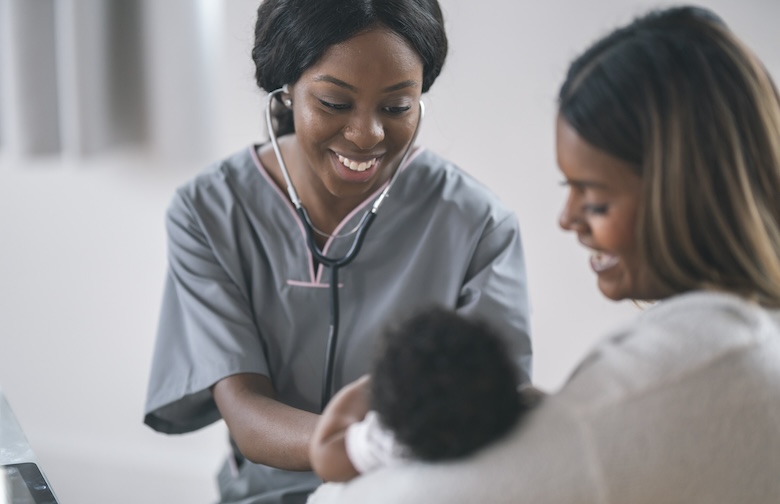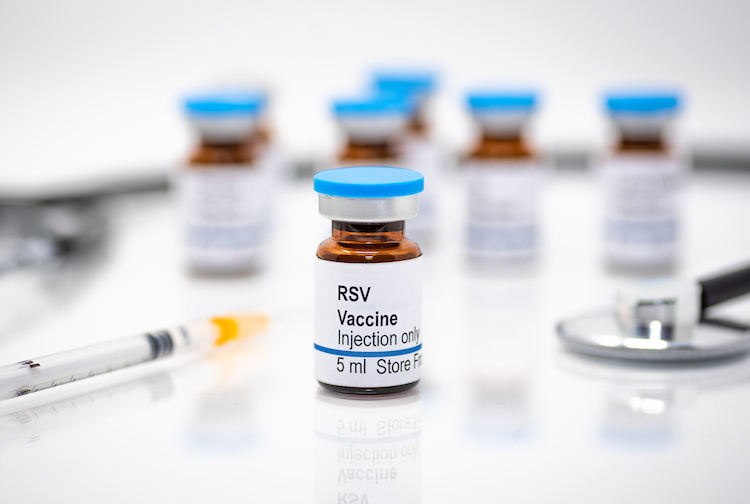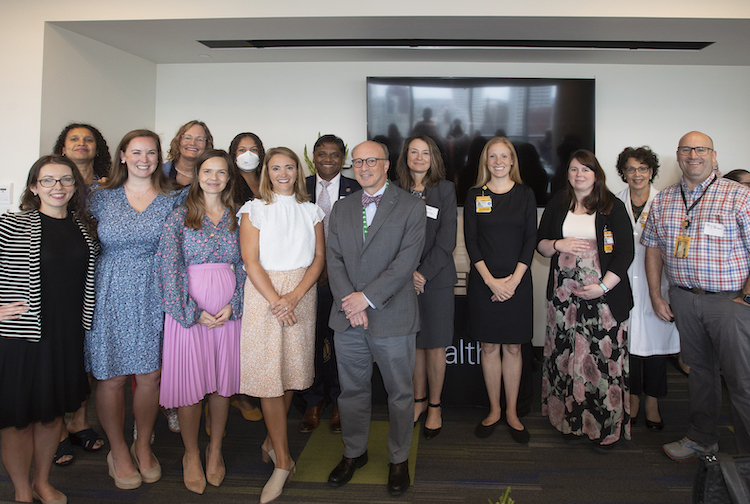
You’re about to give birth: Our OB/GYN experts help you plan during these uncertain times.
May 14, 2020
Doctors Sarah Milton, obstetrician and gynecologist, and Tiffany Kimbrough, pediatrician and medical director of our mother/infant unit, offer tips and encouragement for those welcoming a new bundle of joy.
How would you reassure new parents and parents-to-be during these uncertain times?
Dr. Milton: Being pregnant or being a new parent is a stressful time in the best of circumstances. The most important message we can send is that we’re here for you and you’re not alone — even if it sometimes feel that way with social distancing.
We have a lot of systems in place to provide you with safe access to care, whether via telehealth or in-person visits. I’ve been at VCU Health for a long time, and I’ve never been more proud to work here. I’m proud of our providers and I’m proud of our patients for the resilience everyone is showing through all of this.
How does COVID-19 present in an infant? What symptoms should parents look for?
Dr. Kimbrough: The most-reported symptoms for all age groups are fever, cough and shortness of breath. The interesting thing about kids is that they’re not little adults, they’re different, so diagnosing COVID-19 can be tricky. Kids can have more fatigue and gastrointestinal symptoms, like vomiting, diarrhea or loss of appetite.
We don’t expect families to know for sure. We’re here to support you, whether through a virtual visit or phone call. If you have concerns, please reach out early and often at (804) 828-2467. Keep us updated with any changes in symptoms so we can help. The rates of complications for children is much less than for adults, but they’re not zero, so we do want to hear if children have symptoms and if those symptoms are changing over time.
How is VCU Health adjusting appointments and patient visits for pregnant women and newborns?
Dr. Milton: On the prenatal side, we’ve shifted about 80% of our visits to a remote format, either by phone or video — which is what the American College of Obstetrics and Gynecology recommends across the country. Remote visits provide an additional safety element to prenatal care right now. We can do remote appointments when we don’t have to do lab work or ultrasound.
I’ve found it incredibly rewarding to be able to visually connect with my patients through telehealth and reassure them face-to-face. I’ve been able to draw diagrams and show pictures. I think our patients are enjoying the remote visits, as well. We miss being with our patients, though!
Dr. Kimbrough: We typically see babies in the clinic setting 1-3 days after discharge from the newborn nursery. This quick follow-up helps us make sure that feeding is going well. We also assess for jaundice, which is a complication that can happen after delivery. That in-person visit also allows us to do any necessary bloodwork and help with breastfeeding, if necessary.
After that, we do a combination of home visits and telehealth. A skilled nurse can go to your home and do additional assessments if needed. We’ve also really ramped up our telehealth visits. Through these telehealth visits, we can see how feeds are going and help with latch. Our lactation team is also available via telehealth to provide support.
Moving forward, the in-person visits that are happening for babies are the ones where vaccines are due, so we’re doing touchpoints on the typical schedule all the way to 15 months. We’re still here to support families beyond that. We're trying our best to address sick visits via telehealth and reserve in-person visits for well patients who need to come in for necessary services.
If you’re healthy and plan to have a low-intervention natural birth, should you consider a home birth, instead, during COVID-19?
Dr. Milton: For years, the American College of Obstetrics and Gynecology has had a firm stance that having a hospital-based birth is the safer option for moms and babies. COVID-19 hasn’t changed that. Most healthy moms are going to have an easy process having their babies, but unexpected things happen. If you’re in the hospital when those unexpected things happen, we can manage the situation quickly and safely.
If you start having contractions, when should you come to the hospital?
Dr. Milton: We want expectant mothers to know that our hospital is safe. We have screeners checking patients and visitors at the door, and we’re working really hard to keep people with respiratory symptoms out of labor and delivery.
We want you to come in for all of the usual reasons people would typically come to labor and delivery:
- Contractions occurring every five minutes that are painful and take your breath away
- The baby isn’t moving normally
- Your water breaks or fluid is leaking
- You experience heavy bleeding
Please don’t worry about coming into the hospital. We are here to evaluate you 24/7, and we’re prepared to keep you safe. If you have any question about whether you should come in or not, just call us at (804) 828-4409. We’re here for you!
Do you need to be worried about being separated from your baby in the hospital?
Dr. Kimbrough: There are a few situations where we would discuss separation with a family. It really is shared decision-making between patients and their doctors. This involves talking about the risks and benefits of each side of the situation.
If you are COVID positive, we would discuss current recommendations from the Centers for Disease Control and Prevention and the American Academy of Pediatrics. Right now they’re following similar recommendations to other infectious diseases, like flu, where an abundance of caution dictates separation of mom and baby. Again, this involves discussion with the parents — what’s in your best interest and what your goals are.
If you are is so sick that you need to be in the ICU [intensive care unit], we would more strongly recommend separation because you may be undergoing treatments that will put your baby at increased risk for potentially breathing in some of those particles and contracting infection. We will discuss this with you and develop a plan that everyone feels safe with and that minimizes risk.
How is VCU Health deciding when it is safe for you and your baby to go home?
Dr. Kimbrough: We have a lot of pathways in place to make sure our hospital is a safe place to be during the post-partum period. We want to support you to get breastfeeding off to a good start and make sure we’ve given you enough time to see if your baby has any issues that need addressing.
For right now, the earliest we’re discharging is 24 hours after delivery and then it’s case-by-case, based on when you and your baby are ready. Again, this is done through shared decision-making with you and your family. We want to make sure you have good support and a follow-up plan, and that everyone is safe.
What should visits from family and friends look like at home?
Dr. Kimbrough: I’m a mom, and I vividly remember everyone wanting to come meet the baby, drop off food and lend a helping hand when my kids were born. Right now, it’s important to limit those in-person visits. You can still do phone calls and video chats — I’ve even seen on social media grandparents meeting new grandchildren through the window, making for some really sweet moments.
We do encourage you to use your support systems, but to do so in a socially distant way. People can still drop off meals to your home and leave them on your porch, or maybe run an errand to help out. There will be lots of time when this is all over for in-person visits and grandparents spoiling the new babies.
Do you have any recommendations for parents sheltering in place at home to help make their lives a little easier with a brand new baby?
Dr. Milton: My advice here comes as a mom of two rather than as a physician. I think we’re so fortune to have things like FaceTime, video calls and ways to get creative with family and friends. Set up a routine that includes daily connection to your support system. The postpartum period can be pretty isolating, and there are some really good resources available for new moms who are struggling emotionally. We can help manage this with telehealth visits as well, so please reach out to us if you need help. We’re here for you.
Dr. Kimbrough: As a new parent, I probably sent my husband out every day to buy something the baby needed. Even though we’re recommending limiting your trips out, you can use ordering and home delivery systems for your groceries and those necessary baby items. Or, your support system may be willing to drop things off for you if they’re already running an errand. You don’t have to be completely cut off. There are avenues to get what you need while you’re adjusting to parenthood.
Are there lactation resources available during this time for mothers who may need breastfeeding support?
Dr. Kimbrough: Yes. Telehealth visits are available Monday-Friday with our lactation team.
Please visit VCU Health OB/GYN services for more information on how we can help,



